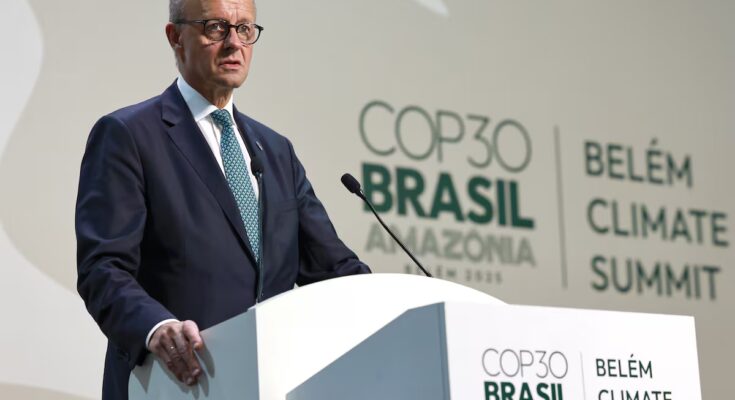Climate policy takes a back seat when the economy is struggling. The years of prosperity in which Angela Merkel became “climate chancellor” are over. Germany has been in recession for two and a third years which will end with only slight growth. High inflation, high energy costs in a sector that consumes large amounts of energy, weakening production in an unstable geopolitical context and budgetary problems have led to climate protection taking a back seat, especially after the change of government from a coalition of Social Democrats, Greens and Liberals to one of Conservatives and Social Democrats.
German Chancellor Friedrich Merz, who took office six months ago, has his priorities clear. “Climate protection that endangers or even destroys the industrial base of our country, climate protection that puts the prosperity of our country at risk, is not accepted by the population,” he told the German parliament at the end of September. Two months earlier he had already declared that they are responsible for only about 2% of harmful gases, so “even if Germany were climate neutral tomorrow, there would not be a single smaller natural catastrophe in the world.”
The conservative leader, reluctant to take a leadership role in this area, tries to defend his idea that giving more breathing space to the economy also benefits the climate. And he also made this clear in his speech at the meeting of heads of state and government in Belém (Brazil), which preceded the United Nations conference on climate change (COP30), where he stated that “the economy is the key” to protecting the climate “even better”.
The change in Germany is evident. The Minister of Energy and Economy, the conservative Katherina Reiche, announced as soon as she took office that more reserve gas plants would be built than expected and subjected the energy transition to a “reality check” with the aim of radically transforming the energy system to reduce costs. For Reiche, the important thing is that the route is more economical and efficient.
Experts such as Veronika Grimm, a member of the economic council that advises the government, reject that the use of fossil fuels is promoted again within these plans. “It’s about driving the energy transition in a cost-effective way. Otherwise we won’t be able to succeed,” says Grimm.
But not everyone sees it the same way. Green leader Felix Banaszak accused Merz of delaying climate protection and the energy transition “every time he can” and of going to Belém with “empty suitcases”. At the same time, he warned of the consequences of a less ambitious German climate policy. “If we give in, everyone will give up,” he told German network N-TV. “Some members of the government openly question Germany’s climate goals and Merz in Brussels has blocked the EU’s ambitious provisional targets for 2040,” he added.
Conservatives are pushing for a possible easing of Europe’s so-called ban on combustion engines, which is of particular concern in Germany, a country with a giant car industry currently in crisis. “Germany has gone from being the driver of an ambitious European climate policy to being an obstacle,” added the environmentalist politician. For now, the EU has already lowered its climate target and externalized its responsibility through the possibility of purchasing emissions credits from third countries.
For Kira Vinke, director of the Center for Climate and Foreign Policy of think tank DGAP, the current situation of climate protection in Germany is “ambiguous”, since considering gas as a transitional solution for ecological transformation can lead the country to new dependencies.
“However, the energy sector is not currently the biggest problem in Germany. More so is the construction and transport sector, in which we are not achieving the goals we have set for ourselves. This means that we have to invest much more in electric mobility and in strengthening our public transport infrastructure. Here too I must say that the Government tends to slow down”, explains Vinke on the phone from Belém.
Disinformation and polarization
The expert hopes that Merz has made concrete commitments within the Rainforest Fund, as Norway has done, beyond simply saying that they will contribute “a considerable amount”. In his opinion “many things remain unclear” in the new executive, which “is still looking for its place”. Furthermore, he points out that there is another problem which is misinformation and polarizing narratives on social networks. “This influences the mood in Germany and endangers the social consensus on climate protection.”
“Merz seeks to bring issues of competitiveness, economic security and economic growth to the fore. This is certainly a change of approach that also aims to address the concerns of German citizens. If you look, for example, at the rising costs of energy and living – although the majority of Germans still live in relative prosperity – many people are worried about rising rents and energy prices,” adds Vinke.
Even important economic institutes in the country show reservations about Merz’s new policy. From the IW they criticize the fact that with the new government it is not clear how much importance they give to climate neutrality and criticize the fact that the lack of clarity on climate policy hinders the will to invest. Meanwhile, Claudia Kemfert, director of the department of energy, transport and environment at the economic institute DIW, warns that German climate policy needs “more courage, speed and vision of the future”.
“Instead of decisive investments in renewable energy, energy efficiency and climate protection, we are seeing setbacks and delays. This was also demonstrated by the last steel summit, where decarbonisation was of little relevance,” he said.
Meanwhile, the Climate Action Tracker (CAT), of the NewClimate Institute, which evaluates the climate protection measures of countries around the world, believes that Germany’s new course endangers climate goals. “The new German government is willing to downgrade and weaken climate policy in all areas,” they wrote in their latest assessment in which they described the country’s goals, policies and funding as “insufficient”.
A moment occurred at the Belém climate summit that could well symbolize this shift in politics in Germany, he reports Naiara Galarraga. Chancellor Merz had a small controversy with Brazilian President Lula, after the German had suggested that Belém was a place to leave as soon as possible: “I asked some journalists who were with me in Brazil: which of you would like to stay here? Nobody raised their hands. Everyone was happy that we could return.” Lula replied that “he should have gone to a bar, danced, tried the gastronomy of Pará, because he would have realized that Berlin does not offer even 10% of the quality of Belém”.



